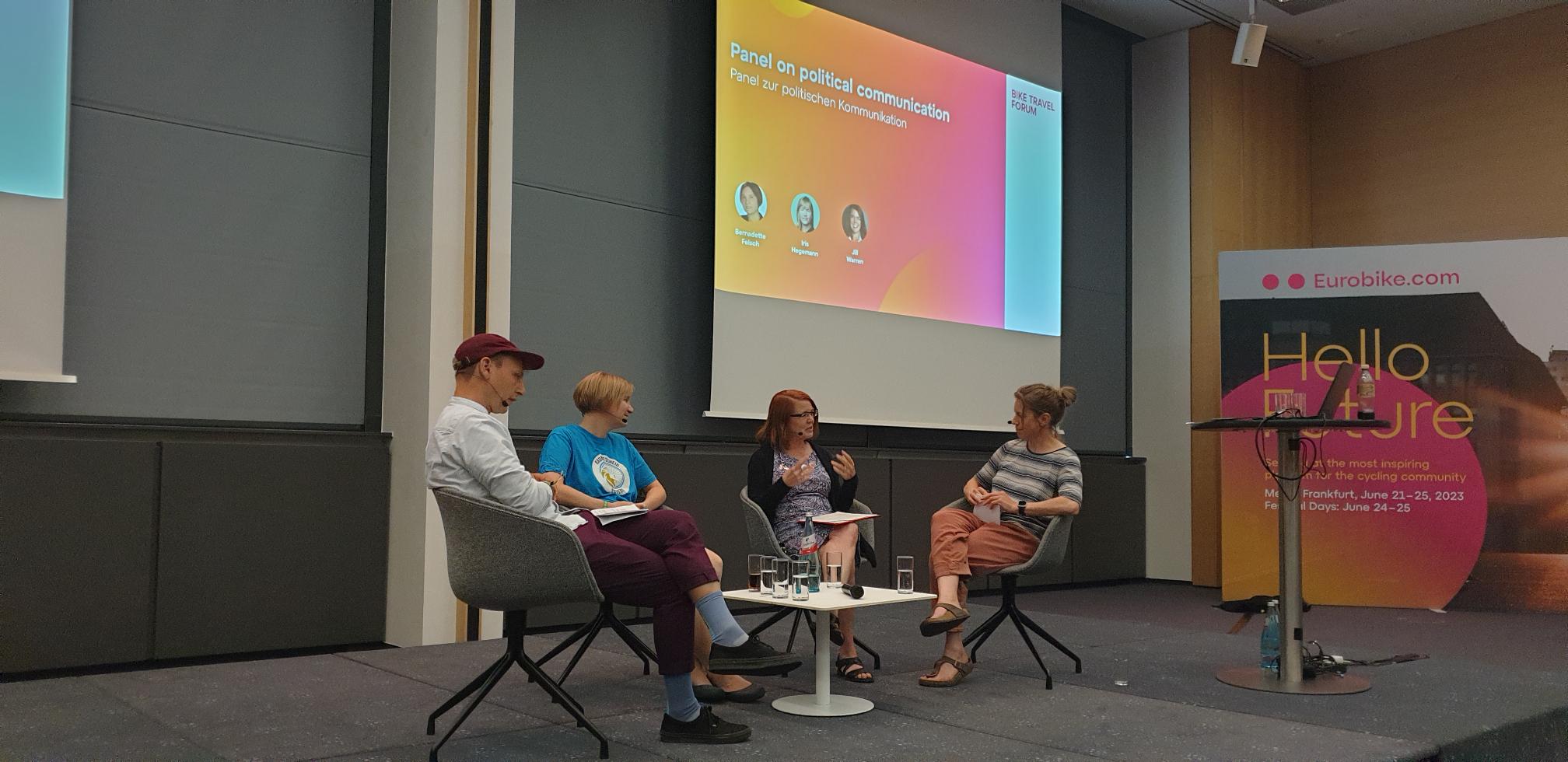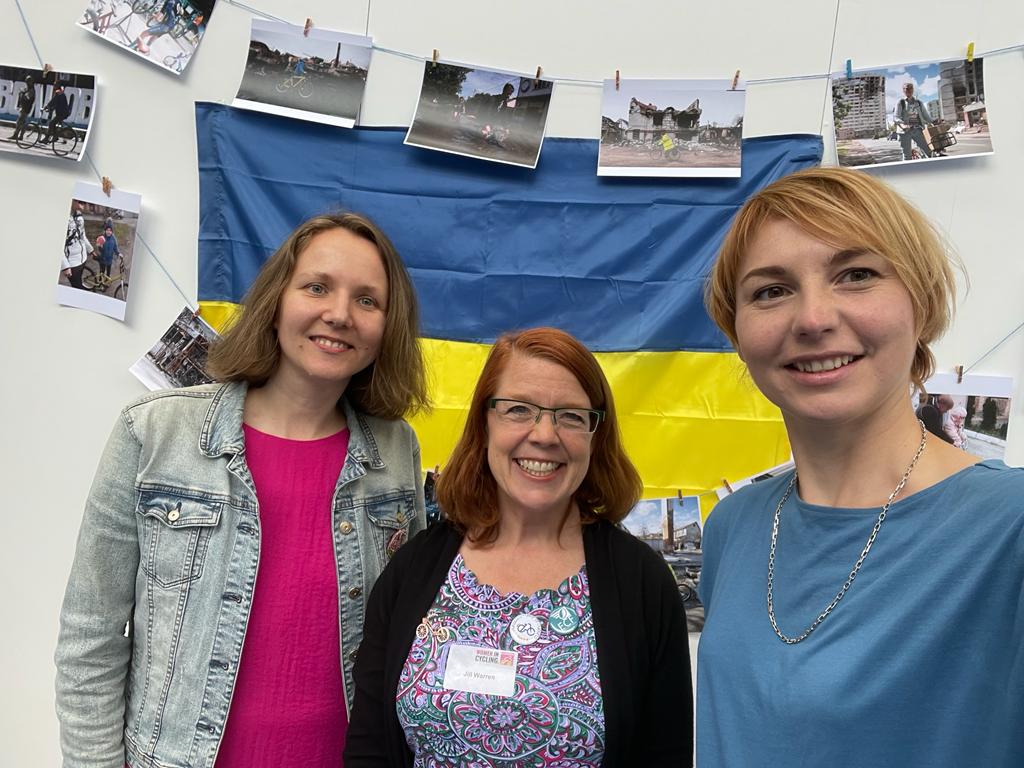
ECF joins the cycling community in Frankfurt for the annual Eurobike Trade Fair
Last week, ECF took part in the annual Eurobike Trade Fair in Frankfurt, Germany. The fair took place from 21 – 25 June, attracting 1,500 exhibitors and 61,150 visitors. The event featured a demo area, political discussions, platforms for the sharing of new knowledge and many networking opportunities. ECF was represented in discussions on smart cities, cargo bikes and cycling tourism.
Held annually since 1991 in Germany, Eurobike is an international bicycle trade fair. It aims to address contemporary global challenges such as climate change and digitalisation by bringing together people from the fields of politics, finance, civil society and the mobility industry to build new alliances and share knowledge and ideas. ECF took part in three of this year’s sessions: “Smart Cities: Usage, Accessibility, Digitalisation”, the Cargo Academy and the Bike Travel Forum.
This year’s fair saw an increased focus on moving beyond the more traditional base of cycling enthusiasts, instead expanding the appeal of the bicycle to diverse and broad demographics. In his inspiring keynote speech, Brompton CEO Will Butler-Adams argued that “This trade fair isn’t talking to women, or even to most men. It’s talking to that small percentage of middle-aged white men who are interested in sports cycling”. This he described as “not good business sense”. Throughout the fair, there was a feeling that this issue was at the front of people’s minds, as the focus shifted from one of a more traditional trade fair to a gathering which aims to tackle the political, social, health and environmental elements of cycling promotion.
“Smart Cities: Usage, Accessibility, Digitalisation”
On Wednesday, ECF CEO Jill Warren moderated the session on “Smart Cities: Usage, Accessibility, Digitalisation” as part of the Future Mobility Stage. This was a conversation with Margot Daris of the Dutch Cycling Embassy and Cornelius Kiermasch of Deutsche Bahn Connect GmbH. The discussion focused on the kinds of smart, secure and accessible cities that we want to see and how this can best be realised in practice.
The participants contrasted the achievements reached and goals set in the Netherlands and Germany, highlighting the differences in approach and stage of development. While bicycle parking at train stations is already quite advanced in the Netherlands, more progress is needed in this area in Germany. An important point brought up by Margot is that it is not enough just to have the infrastructure, but people also need to feel safe using it, for example in parking and retrieving their bicycles late at night. This is an issue which can be especially important for women and should inform our approach to gender equity in active mobility.
Cornelius shared information on Deutsche Bahn Connect’s innovative new service whereby, alongside their annual €49 annual train ticket, customers can rent a Brompton bike for just €41 per month. This scheme aims to boost the interconnectivity of different sustainable modes of transport and has so far seen decent take-up.

Jill meeting representatives from our Ukrainian member U-Cycle, who are running the Bikes for Ukraine initiative.
Cargo Academy
On Thursday, Jill Warren and ECF Policy and Communications Officer Anna-Karina Reibold presented at the Cargo Academy, organised by German organisations cargobike.jetzt and Zukunft Fahrrad. Attracting an audience of about 200 people, the event focused on unlocking the potential of cargo bikes, the “cargo bike boom” and making cargo bikes more accessible and attractive to all users.
Jill and Anna-Karina presented an overview of ECF’s work on cargo bikes and its lobbying efforts at the European level. They presented the cargo bike dashboard and its key figures, such as the 7-fold increase in the number of incentive schemes since 2018, the 73 sharing schemes in 125 European cities and the 150+ new projects and schemes added to the dashboard since March 2023.

Jill Warren and Anna-Karina Reibold presenting ECF's work on cargo bikes.
Arne Behrensen, Senior Expert for the Transport Transition at Zukunft Fahrrad, and Martin Seissler, Managing Director of cargobike.jetzt, also co-presented the results of the cargo bike industry survey at the event. These results showed a 36.3% growth in sales last year and that cargo bike manufacturers expect a 7.3% growth in sales in 2023, despite the tense situation on the bicycle market.
Jaron Borensztajn from Cargoroo and Cycling Industries Europe’s cargo bike expert group discussed the upscaling of cargo bikes to meet EU climate neutrality targets. Based on his calculations, 11 million cargo bikes are needed by 2030. The Cargo Academy also featured a diverse set of topics ranging from technical-focused panels on standardisation to family-friendly longtail bikes to commercial fleets. The academy wrapped up with a presentation from Luise Braun, German Cycle Logistics Federation on the iKnowRadlogistik project and a sneak preview of the International Cargobike of the Year Award (CABOTY).
Bike Travel Forum
EuroVelo, as the longest cycle route network in the world, took part in Eurobike to share experience and data. It was also a valuable opportunity to meet participants and exhibitors to present our EuroVelo business opportunities and discuss mutually beneficial partnerships to boost cycling and cycling tourism.
Jill Warren took part in a panel on political communication to present ECF’s advocacy work for an EU cycling strategy and how it could impact cycling tourism. She stressed the need for data to accelerate the decision process.
Agathe Daudibon, EuroVelo Manager, made a pitch about the boom of cycling tourism and EuroVelo. National studies on cycling tourism show growth in Italy, Germany and France. The EuroVelo Data Hub shows an 11% increase in bike counts on EuroVelo from 2019 to 2022, a 22.5% increase in visits to EuroVelo.com from Google as well as improvements to the network, with 64% ready to cycle in 2022. According to a study published in 2012, cycling tourism represents an economic impact of €44 billion per year with 2.6 million cycle trips in the EU. ECF and the UN World Tourism Organisation (UNWTO) advocate for the renewal of such a study and need sponsors to launch it.
ECF also took part in a masterclass about the quality of cycle routes together with our German member ADFC and German initiative Route 3.0. Quality is key to reaching new users and making others come back. Together with ADFC, the national EuroVelo coordinator for Germany, ECF presented its methodology to assess the quality of long-distance cycle routes with the European Certification Standard (ECS). The methodology can lead to the certification of EuroVelo routes with a minimum of 300 km. The ADFC Certification system for German cycle routes and regions was the inspiration for the ECS and both systems are complementary for more quality of cycling offers in Europe. You can access our leaflet on ECS and more information here.

Jill Warren participating in the panel on political communications during the bike travel forum.
Contact the author
Recent news!
Upcoming events
Contact Us
Avenue des Arts, 7-8
Postal address: Rue de la Charité, 22
1210 Brussels, Belgium









